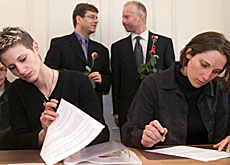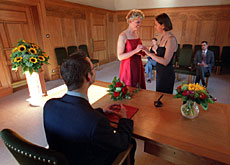Fight goes on for gay couples

Gay couples say Switzerland’s new law recognising same-sex partners as next-of-kin falls short, because it does not allow for marriage or adoption.
But with a referendum looming on the new law, they say the fight for more rights will have to wait.
Parliament on Thursday cleared the last hurdle for a new law allowing gay couples to register their partnerships.
In the case of the death of one partner, the other can inherit shared property without paying a huge tax bill.
But the law does not confer rights to marry, adopt children or undergo invitro fertilisation.
Opposition
A small religious conservative party has already made it clear that it will challenge the decision.
The Federal Democratic Union said parliament should not be supporting alternative lifestyles, adding that it was confident it could collect enough signatures to force a nationwide vote.
The gay rights group, Pink Cross, said on Thursday that its priority was to ensure that the new legislation was not overturned.
Spokesman Jean-Paul Guisan said any attempts to have adoption and marriage rights included in the law would have killed its progress through parliament.
“We needed this to pass in its current form. If we had said ‘it’s marriage or nothing’, we would have got nothing. We need to proceed carefully, and we are so glad to have this much.”
Inheritance rights
Guisan said the law solved the most important problems, such as inheritance rights and the rights of a foreign partner.
He added that it was a welcome first step towards ending discrimination against gays and lesbians in the areas of health insurance, pensions and taxes.
“It also satisfies us on a symbolic level, because the law recognises that same-sex couples exist. That recognises the dignity of all homosexual people, even those who aren’t couples,” said Guisan.
Claude Janiak, a member of parliament for the centre-left Social Democrats, echoed the Pink Cross, saying he was “satisfied” with what had been achieved so far.
“It eliminates the most important areas of discrimination. I feel very grateful that it went through parliament relatively fast,” he said.
“There are still some major questions, like adoption rights.”
Major improvement
Doris Leuthard, interim president of the Christian Democratic Party, also describes the new legislation as “a major improvement”.
Leuthard’s party has traditionally stood for family values and its power base is in Catholic regions of Switzerland.
“Registration gives rights that are comparable to the rights of marriage, even if it is does not allow for marriage like in some European countries,” said Leuthard.
“Of course, there are many countries which have done nothing about this issue.
“I have talked to a number of organisations and many say ‘this is ok for us’. Adoption is more of a concern of lesbians than male same-sex couples. I believe that the law we now have also serves the interests of children.”
The decision by parliament to give gays and lesbians similar rights to heterosexual couples comes three years after the city of Geneva introduced its own legislation governing same-sex partnerships.
Last year Zurich became the second Swiss city to grant official recognition to gay couples.
swissinfo
Gay marriages are legal in the Netherlands and Belgium, as well as in some provinces of Canada and the US states of Vermont and Massachusetts.
Same-sex partnerships are recognised by Denmark, Norway, Sweden, Finland, Germany, Hungary and Croatia.
Under French law, gay and lesbian couples are granted special legal status.
Portugal and several regional authorities in Spain give gay couples the same rights as unmarried heterosexual couples.
Under this law, gay couples can register their partnerships.
They get the same rights as heterosexual couples in terms of pension, insurance and taxation.
It does not confer rights to marry, take the same name, adopt or undergo fertility treatments.
The Federal Democratic Union has vowed to force a referendum.

In compliance with the JTI standards
More: SWI swissinfo.ch certified by the Journalism Trust Initiative



You can find an overview of ongoing debates with our journalists here. Please join us!
If you want to start a conversation about a topic raised in this article or want to report factual errors, email us at english@swissinfo.ch.